November ballot highlighted by propositions on voting, parental rights, border security
grants to vote and border security.
Every odd-numbered year, Texas voters head to the polls in November to cast their support for or reject proposed amendments to the Texas Constitution. This year, Texas voters must decide on ratifying amendments about controversial topics such as parental rights, the rights of undocumented immi -
PENROD staff writer collegian.editor@tccd.edu
Most student filmmakers dream of their work being showcased at a film festival, but NE Campus student Blane North took a different route.
His debut short film, “Mood Ring,” premiered this summer at a private art show in Mansfield. The film played on a loop via projector, accompanied by a sound system and surrounded by artwork created locally. The short blends punk music, live-action visuals and hand-drawn animations into a 10-minute experimental piece that explores emotions through color and sound.
“Mood Ring,” which is free to watch on Vimeo, ignores traditional storytelling altogether. It utilizes the symbolism of shifting color filters, surreal visuals and a soundtrack comprised of local punk bands such as Hate Your Friends and Mount Righteous to guide the audience through the abstract journey.
“When you don’t explain a film, the viewer is able to come to their own conclusions and kind of create their own narrative,” North said.
The project features a small cast of three: his girlfriend who comes from a theater background, her friend and North himself. “Mood Ring” was filmed primarily in Denton with most of the locations scouted by his girlfriend.
“She knows locations better than I do, kind of like hidden gems, and I think one of the most memorable spots is probably the post office up there,” North said.
The idea for the film “Mood Ring” sparked after North saw rings which caught his eye while on a trip with his mother. Some of the symbolism anchoring the loose plot of the short is inspired by other movies such as the mood ring from the 1991 film “My Girl” and the color filters used in the 1966 Czech film “Daisies.”
“A lot of it came in post-editing,” North said. “The storyline kind of came together.”
The post-production phase was where “Mood Ring” truly took

On Nov. 4, 17 amendments to the Texas Constitution will be on the ballot for Texans to vote on. A majority of the proposed amendments focus on ad valorem taxes and property.
Unlike the U.S. Constitution, the Texas Constitution is frequently amended and edited.
NE Campus recently held an event called “Texas at a Crossroads”, where two government instructors discussed the November
2025 ballot proposals. The two key speakers were NE Campus government instructor Derrick Shelton and tenured government professor Lisa Uhlir. Shelton and Uhlir went over the 17 amendments, providing depth in the language used on the ballot and informing students of noted political arguments both for and against each amendment. The event had an estimated attendance of 100 people.
According to Uhlir, Amendments 15, 16 and 17 are the “big three” of the proposed amendments.
Proposition 15 affirms that a parent has the responsibility to nurture and protect their children, and should have the initial and most prominent say in decisions involving their children’s upbringing.
“This proposition will codify that longstanding case law in the Texas Constitution to ensure that this important right cannot be removed or diminished by future court opinions that the parent-child relationship improved in
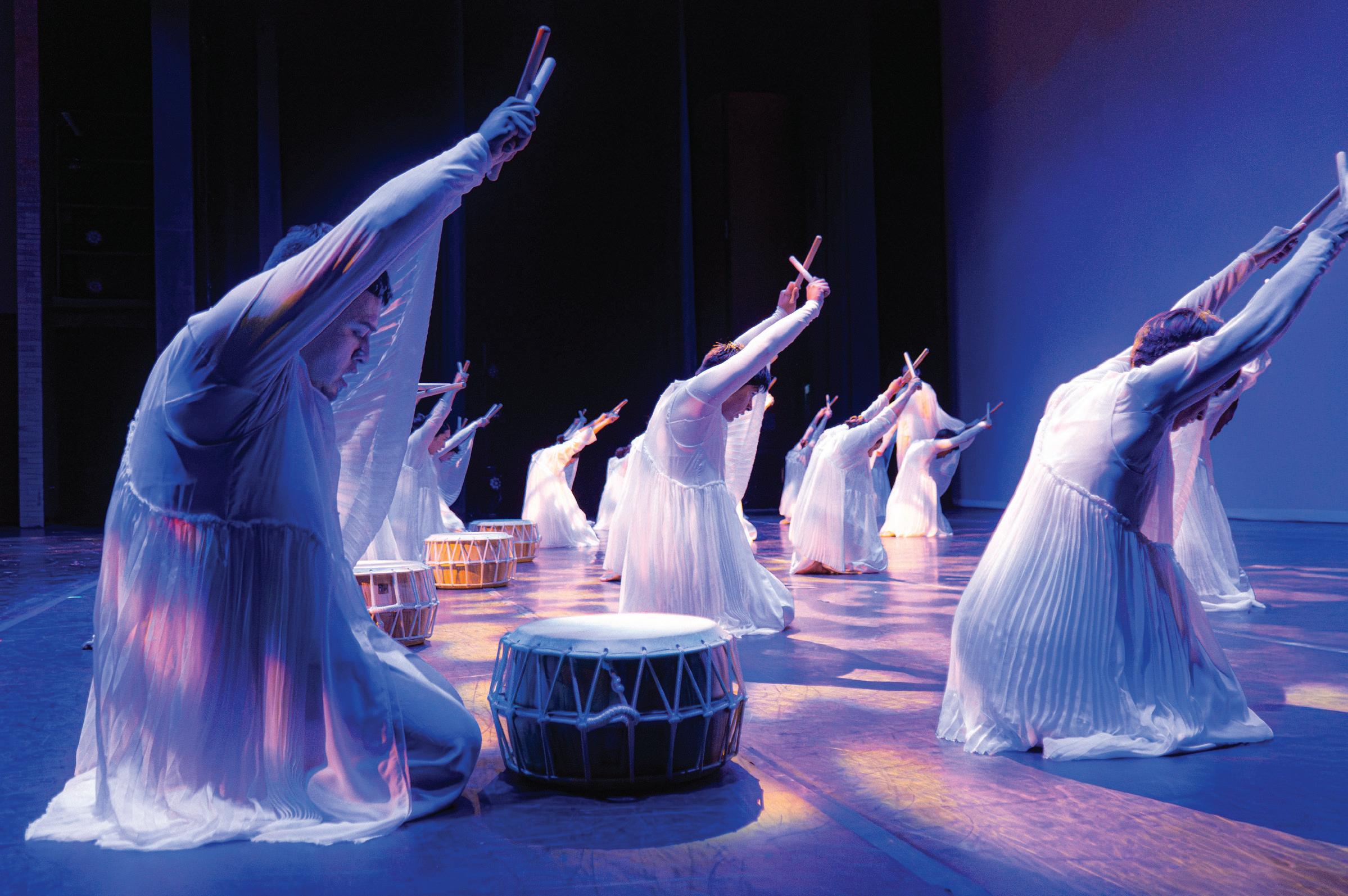
Dance teams unveil talent at festival
AIRIANNA ROMAN AND HOPE SMITH campus editors airianna.roman@my.tccd.edu hope.smith393@tccd.edu
Dance teams from NW and NE campuses performed at the Fort Worth Dance Festival on Oct.5, showcasing a variety of solo and group dances.
The three-day festival, hosted by I.M. Terrell Academy, aimed to celebrate community and offer exposure to different professionals and dance platforms in the Fort Worth area.
After joining the NW Mosaic Dance Project and competing with them for about six years, NW student Hunter Robinson performed his first solo dance at the event.
Robinson said dancing makes him feel free, helps with his emotions and makes use of the muscle memory. He said movement is
medicine for him.
“It really makes me use my brain, and keep myself in check, like be in the moment and just let the music take control,” he said.
It was really nerve wracking ... But once I got on stage and started doing the movements, it vanished.
Hunter Robinson NW student
Robinson’s solo, “The Space Within,” is about the amount of space around him and what he is able to do with that space.
“I could move to the corner, the side, the center or mid-center. I
could do anything,” he said.
Robinson said he doesn’t go by the rule that practice makes perfect. He said he’s perfectly imperfect. For him, practice makes progress.
“I need to be very presentive and show the folks that I got this, and I own the dance, and I own all the moves and everything within,” he said.
Robinson also performed with five other Mosaic dancers, including NW student Ana Higa, to the song “Solid Ground” by Michael Kiwanuka.
“It’s the contrast between how people see you, or how people feel around you, and how you feel around them,” Higa said. She said Kiwanuka talks about individualism and whether being alone could be a good or bad thing.
“I try to express whatever I feel the song is about, or whatever I feel that I need to express in that
moment, depending on the vibe of the song and the choreography,” she said.
Higa said it would be great if the audience knew exactly what it is she tries to interpret, but everyone thinks differently.
“If they have a different idea, or they saw something different in the dance, it’s pretty interesting, because it’s different experiences that can affect the way we think about certain stuff,” she said.
Another Mosaic dancer, NW student Emily Frost, said she wasn’t nervous about the dance at all. In fact, performing is what she’s passionate about.
“It helps me have a lot more self-control and self-discipline,” she said. “It really helped me with my sense of confidence as well.”
Amy Jennings, NW associate professor of dance and the director of the Mosaic Dance Project, said
County officials discuss local government roles
NANDA ACHARYA campus editor nanda.acharya@my.tccd.edu
Three current and former Tarrant County officials came to NE Campus Oct. 2 to talk to students about the inner workings of county government. District Clerk Thomas Wilder, former County Judge Glen Whitley and County Clerk Mary Louise Nicholson made up the panel. Precinct 2 Commissioner Alisa Simmons was expected as well but did not attend.
At the event, Whitley said the county, with just over 2.2 million people, is the third largest in Texas and 15th in the country. He explained how the Commissioners
Court is the leadership unit that takes care of county-wide policies like approving budgets.
“What county government does, really more than even cities and school districts, is we implement and put in motion what the federal and the state governments pass in the form of laws,” Whitley said.
Concerns over picking the right career path for college students were made by Wilder. He said it is better to pursue a twoyear degree in something students like and can make more money with rather than just go to a fouryear college for something less monetarily beneficial.
He shared the story of how his granddaughter has yet to pay off

Wellness, study advice shared at event
Research shows sleep, stress reduction increases exam success
LAYLONI CONERLY-WEST staff writer collegian.editor@tccd.edu
Students got practical tips on study skills and time management aiming to reduce stress and improve academic performance throughout their college career during an event on TR Campus.
“Life Hack Lotto” was presented by TR success coach Omar Liddell and mixed games with growth.
The event introduced students to study hacks and time management tips in an interactive way, offering strategies to help them balance school, work, and personal life.
The tips focused on breaking away from bad sleeping habits, improving focus, digital detoxes and building healthier study routines, while highlighting small changes that can lead to big results.
Liddell said the event gave students tips to succeed.
“Study hacks give us the opportunity to be winners in class work and professions,” he said. “By engaging, we have the opportunity to win.”
TRINITY RIVER
He said interactive events help break down barriers between learning and fun.
“Combining those two things gives students the thrill of winning a game while also identifying useful information,” Liddell said.
Among the hacks shared were time-blocking schedules, using Pomodoro study breaks, studying in different locations to boost recall and turning off screens an hour before bed.
Research shows students who sleep seven to nine hours score higher on exams, while those who plan their weeks earn higher GPAs.
Liddell said the event ties directly to TCC’s mission.
“The entire point is to present study hacks that increase performance,” he said. “We hope students develop personally and professionally by using the information to reduce stress and approach academics with more focus.”
He added that many students don’t know what resources are available to them or hesitate to ask for help. Events like this, he said, make it easier to find tools that work.
South career adviser Carl Scherrieb said patience is one of the most important traits for a student to succeed in classes..
“Be patient with yourself,” Scherrieb said. “College is about learning time management and selfconcept, and it takes persistence to not over extend yourself while working toward your goals. How you deal with adversity is what makes you stronger.”
Steve Long, a South academic support staff, said the best students take action before and after class to improve their academics..
“Preparing before class, taking good notes, and then using those notes after class really helps students succeed,” Long said. “Do something with what you’ve learned before the next class meets.”
Liddell said he wants to see students succeed.
“Every student has the opportunity to perform at the highest level and grasp their greatest hopes and dreams,” he said. “I genuinely want to see every student accomplish their dreams and be the best version of themselves.”
Trinity Metro offers transportation opportunities
Bike the Trinity Trails took place Oct. 3, encouraging students and faculty to see what the college provides for them outside of the classroom.
In an effort to expose students to the transportation services available, TR student development coordinator Carly Johnston organizes many events to help students interact with one another and see what the campus has to offer.
“So today’s event is part of a longer series called ‘TCC Out on the Town’ and the goal of that whole program is to get students off campus for a variety of reasons,” she said.
Johnston said the program helps students who may not have had an opportunity to have fun off campus and connect with their peers while developing a sense of belonging.
Brianna Gomez, a student development coordinator with Student Activities, joined the event to get more comfortable riding a bike and was scared at first but felt confident afterwards.
Gomez said there are more benefits for students riding a bike rather than other forms of transportation due to carbon dioxide release.
“We talked about the carbon neutral thing, like teaching them that there’s alternatives to maybe starting your car if it’s like a five-minute drive or something close, espe-
Amendments
(continued from page 1)
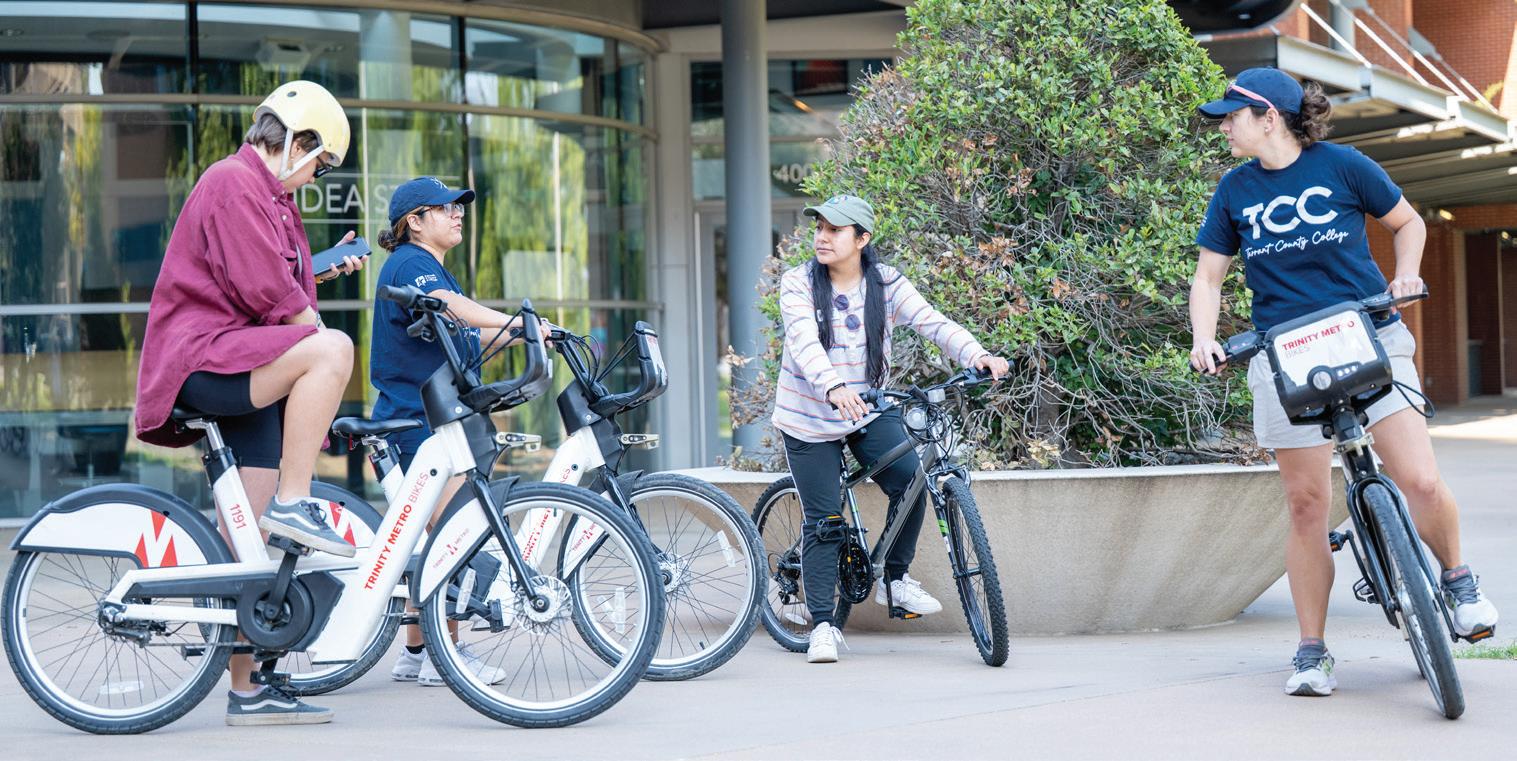
Students and faculty meet to explore the
for
two hour ride at 10 a.m. outside the Ideas Store on TR Campus Oct. 3.
cially because downtown is so connected like you can walk anywhere,” Gomez said.
The program has led students to this bike event, a Rangers game and museum trips along with many more to come.
“So, the whole program came as a result of a leadership project I did about a year ago that showed that TCC pride was very low,” Johnston said.
Johnston said that in comparison to schools like UT Arlington and TCU, students are often not seen wearing TCC T-shirts and other merchandise in public.
natural law should be safeguarded,” Shelton said. “Fifteen will also make assessing the right simpler, less costly and easier for parents and lawyers, allowing them to cite the constitution to help defend their rights in court.”
Shelton also cited the arguments of critics of Proposition 15, stating critics say it “focuses too heavily on the rights of the parent, without including language to ensure that children’s rights and best interests are protected.”
Proposition 16 establishes a parameter for voting in Texas, stating that non-citizens cannot vote. Uhlir pointed out the redundancy of this proposition, as it is already required by federal election law that a voter must be a U.S. citizen.
“It’s very symbolic.” Uhlir said. “There are several states that allow non-citizens to vote, and some of the critics of that say if we put it in, then it gives legal rights to defend that right. This is about future potential movements to include noncitizens.”
The final proposed amendment, Proposition 17, authorizes the legislation to provide a home tax exemption for property bordering Mexico if the property has border security infrastructure installed or constructed on said property.
“Those resources could be a higher fence. It can be cameras or other security surveillance systems. What they’re saying is that if you’re a property owner, Proposition 17 is trying to get you a tax exemption for having those devices.” Shelton explained.
Critical arguments for Proposition 17 that Shelton cited were disapproving of the state “incentivizing” border security infrastructure on private property.
“The tax exemption carries on revenue reduction for local governments by rooting property tax value from the tax rolls, which would narrow the tax base and shift the tax burden onto other property owners,” Shelton said.
The organizer of the event, the NE assistant government professor and NE Faculty Association president, Leigh-Anne Regenold, said the students
With exposure to meeting other students and the ability to make friends, participants of the program can be more involved with their school.
Events like this give students swag to show them they are important to the college’s community.
“The main goal is to like get students off campus to have some fun and then through that process get them to appreciate being a member of the TCC community,” Johnston said.
Participants were given the option to either bring their own bike or rent one from
were “really engaged in understanding what some of the language means, which was the point of the program.”
“This is the opportunity for Texans to have what we call ‘direct democracy’,” Regenold said. “That 17 is one of the largest numbers I’ve seen in many years for constitutional amendments. And while some of them seem pretty boring, others may have some significant impact.”
Several students at the event asked questions during the discussion time and voiced their thoughts on these proposed amendments.
NE student Megan Odom said the proposed increases in tax exemption for disabled for elderly households outlined in Proposition 11 would impact her family.
“Both my parents are considered disabled. Both my parents are deaf. I obviously want to ensure that they aren’t getting their house taxes raised because we have a set income,” Odom said..
Voter turnout for these local elections tends to be lower than federal elections, according to Regenold.
“I worked as an election judge for a constitutional amendment election and on election day I had a precinct that had about 5,000 people in it.
“I always ask students ‘How many do you think showed up?’. They’re like ‘a hundred or twohundred, or a thousand, and I’m like ‘Oh no, way lower.’ I had six voters that turned out in a precinct of about five thousand people,” Regenold said.
Most of the proposed amendments are tax and funding focused.
“They’re very business-friendly. I don’t know how Texan-friendly it is,” NE student Joann Condron said. “I know they are trying to draw in a lot of investments and a lot of businesses, but what about the Texans that already live here and don’t necessarily qualify for capital gains taxes, or have property or livestock? A lot of these bills may or may not be things that need to be addressed, but they don’t really do much for the average everyday Texans.”
Early voting for the proposed amendments starts on Oct. 20 and ends on Oct. 31.
the Trinity Metro bike stalls around campus through the Easy Ride Program, which allows students access to Trinity Metro buses, TEXRail, rideshare vans and the Trinity Railway Express.
“We had an event this past spring semester where we rode the Orange Line, which is one of the bus routes for Trinity Metro,” Johnston said.
According to Trinity Metro, students with a student ID can access most transportation methods for free.
“The point of that event was to get them to get on a bus and get their ID card and learn how to use it so they’re not nervous to use public transportation on their own if they need it in the future,” she said.
The program has various stalls for rental bicycles set up around downtown Fort Worth.
“As long as students are enrolled in three credit hours or 48 continuing education contact hours, they are good to go!” Trinity Metro website stated.
Events like the Bike the Trinity Trails could spread awareness for students about the program, and if enough students show interest, maybe one day the bikes could be accessed for free as they do buses and rideshare vans.
“I guess that’s another goal for today would be for them to learn how to use the Trinity Metro bike system and like navigate the app and navigate renting a bike,” said Johnson, who said the event will likely repeat in the spring.
Upcoming Nov. 4 propositions
Proposition 1 (SJR 59): Creating funds to support the capital needs of educational programs offered by the Texas State Technical College System.
Proposition 3 (SJR 5): Denying bail under certain circumstances to persons accused of certain offences punishable as a felony.
Proposition 7 (HJR 133): Providing for an exemption from ad valorem taxation of all or part of the market value of the residence homestead of the surviving spouse of a veteran who died as a result of a condition or disease that is presumed to have been serviceconnected.
Proposition 8 (HJR 2): Prohibiting the Legislature from imposing death taxes applicable to a decedent's property or the transfer of an estate, inheritance, legacy, succession, or gift.
Proposition 11 (SJR 85): Increasing the amount of the exemption from ad valorem taxation by a school district of the market value of a residence homestead of a person who is elderly or disabled.
Proposition 12 (SJR 27): Relating to the authority of the State Commission on Judicial Conduct, the tribunal and the Texas Supreme Court to more effectively sanction judges and justices for judicial misconduct.
Proposition 13 (SJR 2): Raising the exemption of residence homesteads from ad valorem taxation by a school district from $100,000 to $140,000.
Proposition 15 (SJR 34): Parents are the primary decision makers for their children.
Proposition 16 (SJR 37): Voters must be United States citizens.
Proposition 17 (HJR 34): Providing an exemption from ad valorem taxation of the amount of the market value of real property located in a county that borders the United Mexican States that arises from the installation or construction on the property of border security infrastructure and related improvements.
she thought the group performed well. She said they just learned “The Edge of the World,” this semester.
“It’s really great to see them take the stage, own the stage,” she said.
Jennings said Robinson had worked with a new choreographer from SE Campus, Giancarlo Mendez, and it was a great collaboration.
“That’s one of the things that we love about the work that we do,” Jennings said. “We bring in a new choreographer so our dancers try on new works.”
Jennings said she watched Robinson grow over the years and thought he deserved a solo. She said she was proud of his work.
“It was really nerve-wracking,” Robinson said. “But once I got on stage and started doing the movements, it vanished. In order to be brave, you have to be scared.”
NE Movers Unlimited Dance Company closed the first day of the festival with a 15-minute performance titled “Gee: Of the Earth Within.”
Kihyoung Choi, a NE dance professor and director of Movers Unlimited, explained that the dance imitates the struggle of coping with difficulties in life. She said that it is physically strenuous and would push the dancers to their absolute limits.
Because of this, however, she said it brings the dancers extremely close together and creates a strong bond of unity and move-
(continued from page 1)

Officials
her college debt of $40,000.
ment as one on the stage.
“You can see toward the ending that they just reach the extreme fatigue, but they just kept going just because they have each other,” she said. “There’s some beautiful moments as a performer, as a choreographer and also as an audience. When I see them, that’s really what’s striking to me.”
NE adjunct dance instructor Najwa Seyedmortez, who was among the dancers performing at the festival, was a student under Choi in 2013 and returned to TCC to help teach dance.
What kept her coming back to dance was her experience with Movers Unlimited and the almost unexplainable feeling of catharsis dancing on the stage with the company.
“Once you taste it, you cannot forget. You keep searching for that,” Seyedmortez said.
She said that the feeling starts when dancers have pushed themselves past the brink of effort.
“When you completely use up all the energy, it’s so weird that your body itself starts to move by yourself,” she said.
NE associate professor of dance and Movers Unlimited dancer Hyun Jung Chang explained that she was most excited to connect with others.
“We’ve been working really hard for this moment, so I’m just really looking forward to the first breath on stage together,” she said just before the performance.
shape in production.
Despite being new to filmmaking, North handled all of the editing in DaVinci Resolve and took an unconventional approach to animation: printing individual frames, coloring them by hand, scanning them back in and compositing them manually.
“I use a lot of handmade animation, so there’s no stock things,” North said. “That was tedious work, but it adds this fun to it.”
NE student Bryce Ditslear is currently taking a film appreciation course. He recently watched “Mood Ring” and observed a contrast between North’s film and the current state of Hollywood.
“I could see that he had a lot of fun and passion working on this film,” Ditslear said.
“There’s not a lot of passion in these big proj-
(continued from page 1)
“Well, I’ll just tell it like it is, a college degree isn’t worth what it once was,” he said. “She has two master’s and is a teacher. Teachers make about $60,000 a year, right? It ain’t worth the two master’s. But I told her, ‘If you’ll move back to Texas, Pawpaw will take care of your Ph.D., and you go into administration.’ That’s where the money is.”
Nicholson talked about how her department oversees public records and documents such as land, home, bank and city records as well as passports and marriage licenses.
“I say very few people are going to go through life as a citizen of Tarrant County without coming to see me. You will come to my office,” Nicholson said. “You may never see the sheriff. You may never see the district clerk. But you’re going to come do business
with me, and I’ll tell you why. Because in the County Clerk’s Office, by the Constitution and statute, I’m responsible for life’s most important documents.”
Panelists answered some of the student questions asked through a Google Form accessed through a QR code, which was selected and read out loud by Leigh-Anne Regenold, a NE associate professor of government who helped organize the event.
Regenold said she preferred the QR code because she has seen inappropriate questions be asked in other events and gets more questions that way from students too nervous to stand up and ask.
“When I have elected officials on campus, I tend to prefer the QR code simply because I get more questions that way ... but also because then, I’m protecting the college
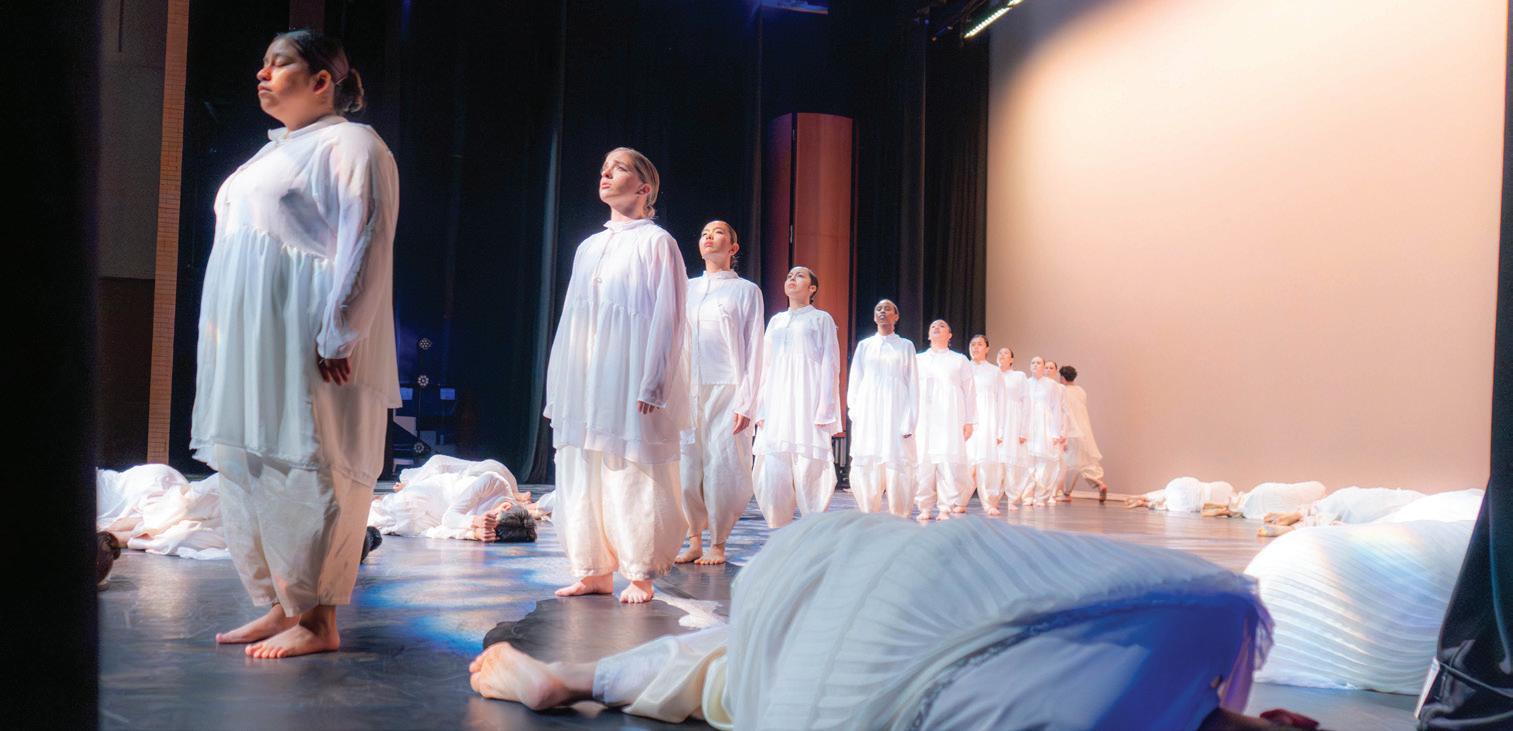
NE dance student Ethan Bui said he was ready to create new memories with the dancers and was happy to find out that his parents would be in the audience to watch his performance for the first time.
“I’m excited to feel everybody’s presence on stage,” he said. “It’s going to be way different than what we had practiced, and I feel like it’s just more I feel more connected when you know you’re actually performing.”
To prepare for the dance, Choi said that the dancers gather together right before approaching the stage and take a breath together,
ects that Hollywood is putting out.” North is part of a growing wave of creatives emerging from TCC’s radio, TV and film programs at NE Campus. Darryl Hoelting is a full-time faculty member of this department which is helping lead students on a path of practical and hands-on production. His instructing style is reflected in the DIY attitude North took while crafting “Mood Ring.”
“It’s easy to assign projects and have everything there for them, but in real life that’s not going to happen all the time,” Hoelting said.
Students are finding space to develop their ideas and contribute to the local arts ecosystem.
“We’re in this field and into these things for a reason,” North said.
by making sure that we don’t have some very inappropriate [questions],” she said.
She emphasized the importance of governmental awareness for today’s students, not only at a national and state level but also at a local level.
Regenold said she wanted to bring awareness to how county governments work differently than state governments.
“Students, especially younger students, tend to think about government, politics as the President of the United States, and often don’t realize that there are dozens of other people that they vote for or get the opportunity to vote for, and that have way more influence over the things that they do every day,” she said.
Some students said participating in this event encouraged them to explore county positions for themselves.
creating a feeling of unity and calamity. Dancer Kevin Juarez said that he was focused and ready right before the performance, and afterwards he felt the team had completed the mission they set out to do.
“We want the audience to walk away satisfied, to think about the show and what each piece meant, not just ours,” he said. “We want them to think about it throughout the week, and to know that there are people out there taking all types of crafts –– especially dance –– seriously. And it’s unifying people at a time like this.”

“We got some good intake from it, and we did some research of our own as they were talking, just to kind of follow up with what he was saying,” NE student Amanda Vaz said. “And yeah, think we got some questions answered for sure and what potential jobs we might not look into.”
Vaz explained underpayed jobs were the most concerning.
Another NE student, Millicent Williams, who attended the event said her interest in law was piqued by Wilder’s discussion on felony courts and his responsibilities.
“I’ve always been curious about civil, criminal, felony courts and stuff like that,” she said. “So, they had a lot to say about that, and how many courts it was. I didn’t really know, but now I do know how many criminal courts, felony courts or whatever that they have.”
Sept. 28
NW: Report of public indecency and was referred to student conduct.
Sept. 29
TR: Property was accidentally damaged and was referred to student conduct.
South: A moral disorderly conduct was reported in the main building.
NW: Accidental damage was caused to property and an investigation is active.
Sept. 30
TR: Property theft valued at less than $750.
SE: Displaying of obscene images was reported and an active report was made.
TR: Proactive or offensive assault was reported in the West Fork.
SE: Property theft valued at less than $750.
NE: Active report of a runaway minor.
Oct. 1
TR: Criminal mischief resulted in damage of less the $750 in the West Fork.
Oct. 2
NE: Criminal mischief resulted in damage of less the $750 on campus grounds
Oct. 3
NW: Active report made of public indecency.
TR: A moral disorderly conduct was reported in the main building.
Celebrating Hispanic
How do you express your heritage?
National Hispanic Heritage Month has been celebrating the Hispanic and Latino influences that have been ingrained in American culture throughout its history.
Observed each year from Sept. 15 to Oct. 15, the month-long celebration started out as the National Hispanic Heritage Week, which was signed into law
in 1968 by President Lyndon B. Johnson and was expanded to a month in 1988. The starting date of Sept. 15 was chosen because it marks the anniversary of the beginning of the Mexican War of Independence, and the month encompasses many important dates in the Hispanic community.
Hispanic Heritage Month is also an opportunity
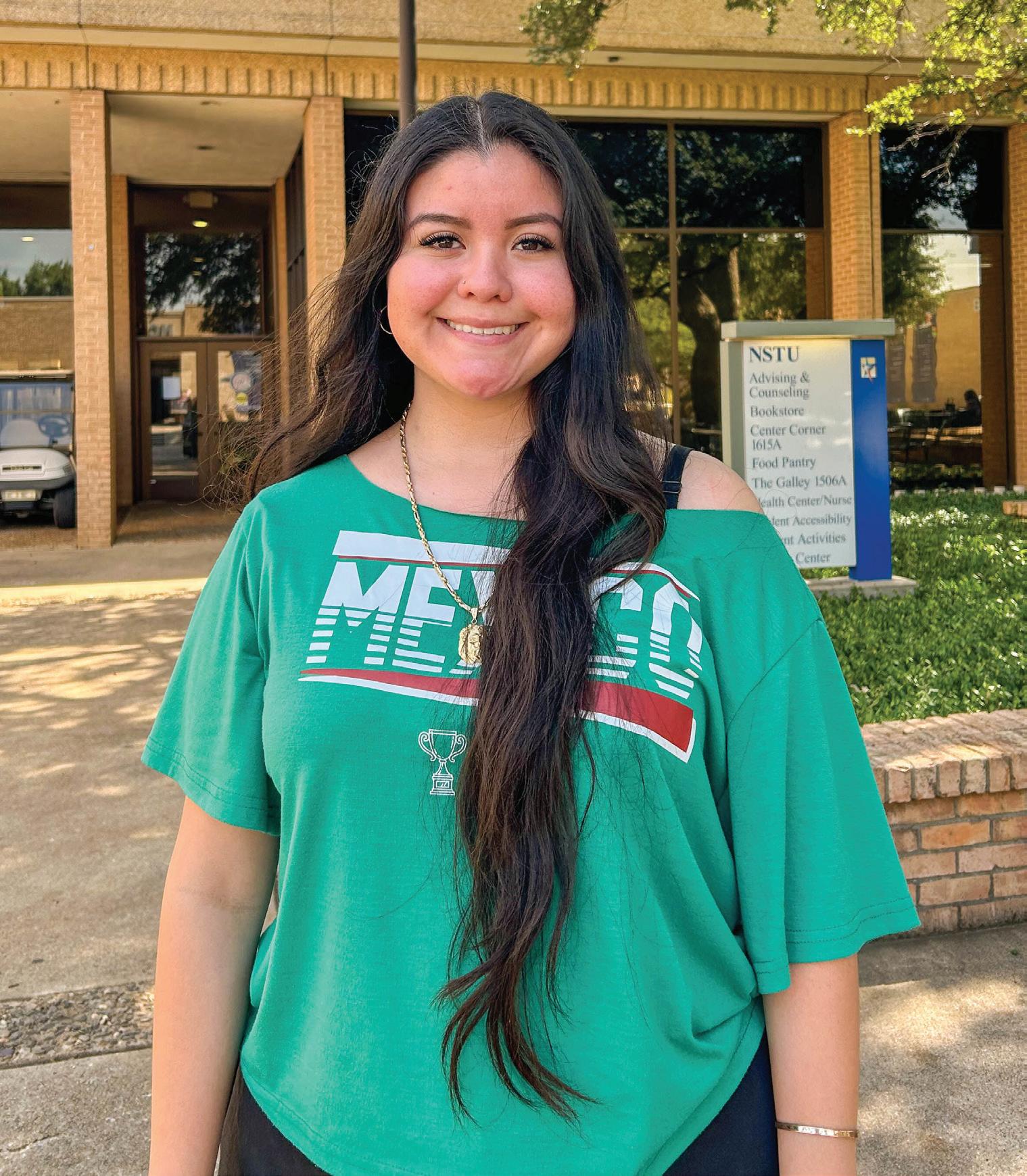

“Typically, the main celebration that we do is during Christmas ... We celebrate it the day before. For us in America, it’s Christmas Eve, but we start celebrating it the night before ... My family, we’re from El Salvador, it’s a country in Central America. We have special parades ... We’ll eat papas con pollo, which is bread and chicken ... So, our foods are a little different ... A big thing is our traditional color is cobalt blue. So, they’ll make dyes out of that using a certain flower.”

for Hispanic and Latino Americans to connect to their roots and be recognized for the contributions they and their ancestors made to help shape the U.S. into the nation it is today.
TCC students across the district recently shared what Hispanic Heritage Month means to them and how they celebrate it.
Mia Marín, NE Campus

“The main way I like to celebrate my culture is through dance. To be honest, I grew up in a predominantly Hispanic area, thankfully. And I know most people don’t have that privilege, but because of that, I was able to grow up dancing. I was able to be really connected to my roots with speaking Spanish and being able to grow up with peers who look like me, talked like me and act like me. With that, I think that I’ve always been very connected to my roots, specifically with dancing. There’s multiple kinds of different Hispanic dancing. My family, specifically, is from Mexico City, so most of the dance that we do involves, like, complicated spins and moves and everything like that. Most of the dance we do are cumbias. If you live up more up north, you grew up with more norteñas. Norteñas literally just means northerners. We do incorporate Salsa, [it] is a more like a Puerto Rican style dance.... we do bachata
Eirene Jefferson SE Campus
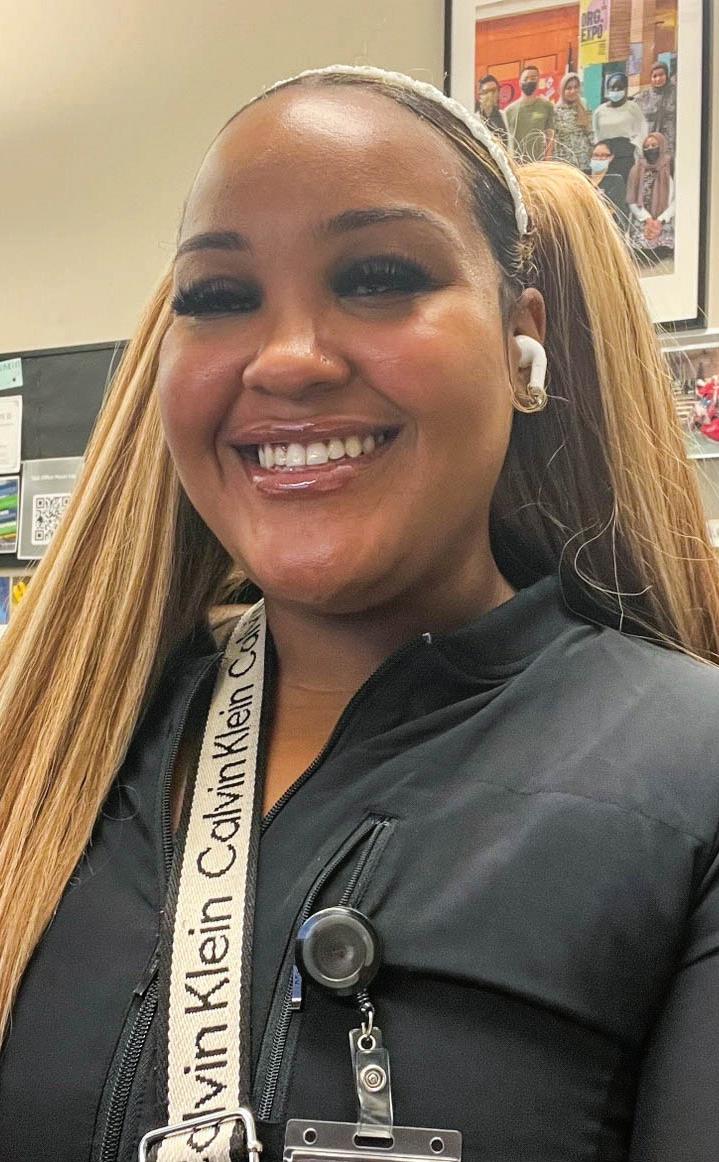

a lot of the more Mexicana tradition with making tamales on Christmas Eve, that’s like one of the biggest things we were able to do ... Because my mom’s grandmother was able to that with her, so it was just a little piece of her ancestors that she took with her and was able to incorporate it into our lives. Just being multicultural, it was important that we kept who we are and understand who we are.”


“I love the hard working, family orientated, career driven people. That’s what they do. I know someone whose family also started a business and now they profit a million dollars, like coming from nothing from Mexico, ready to risk it all.”

Hispanic Culture
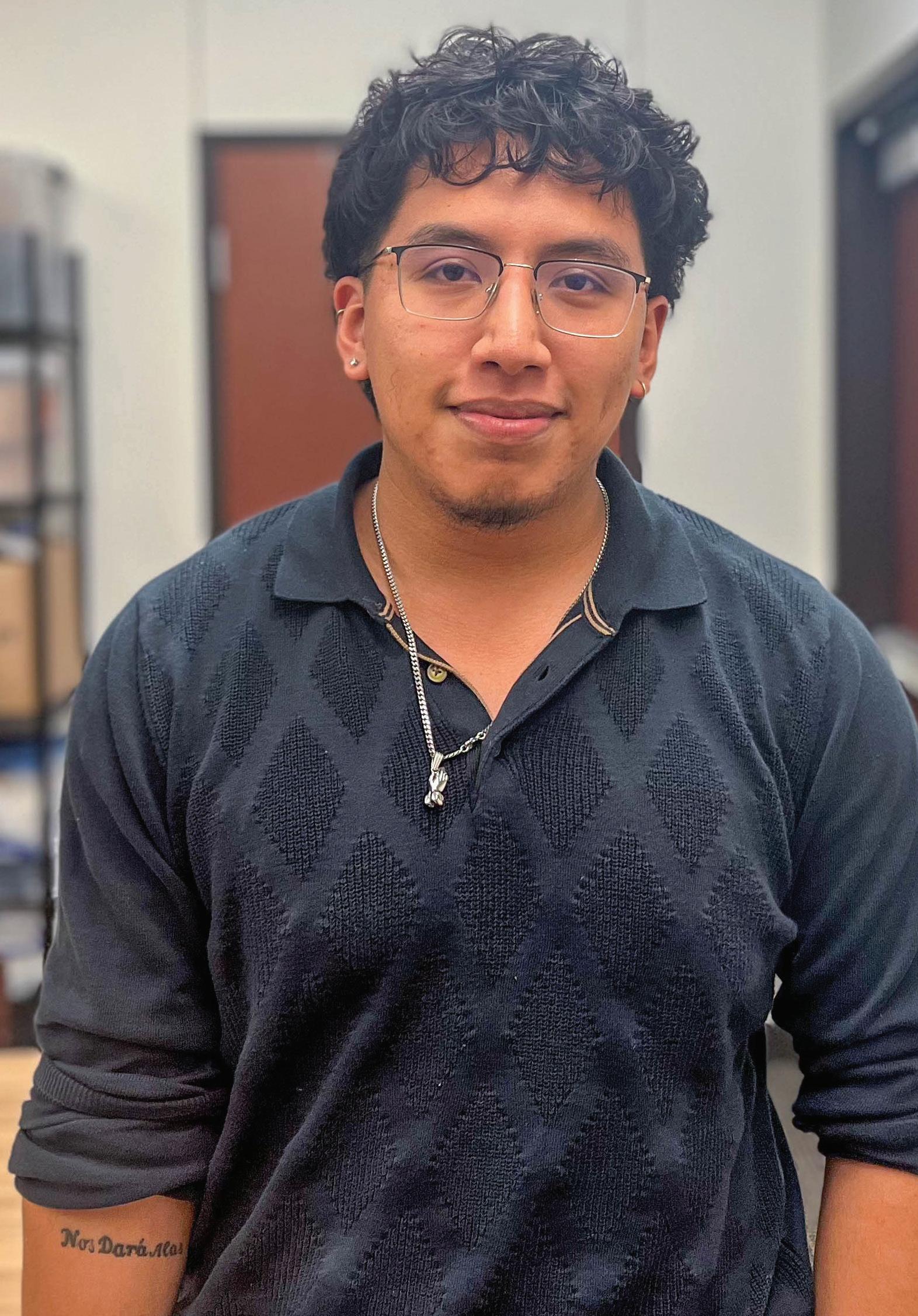
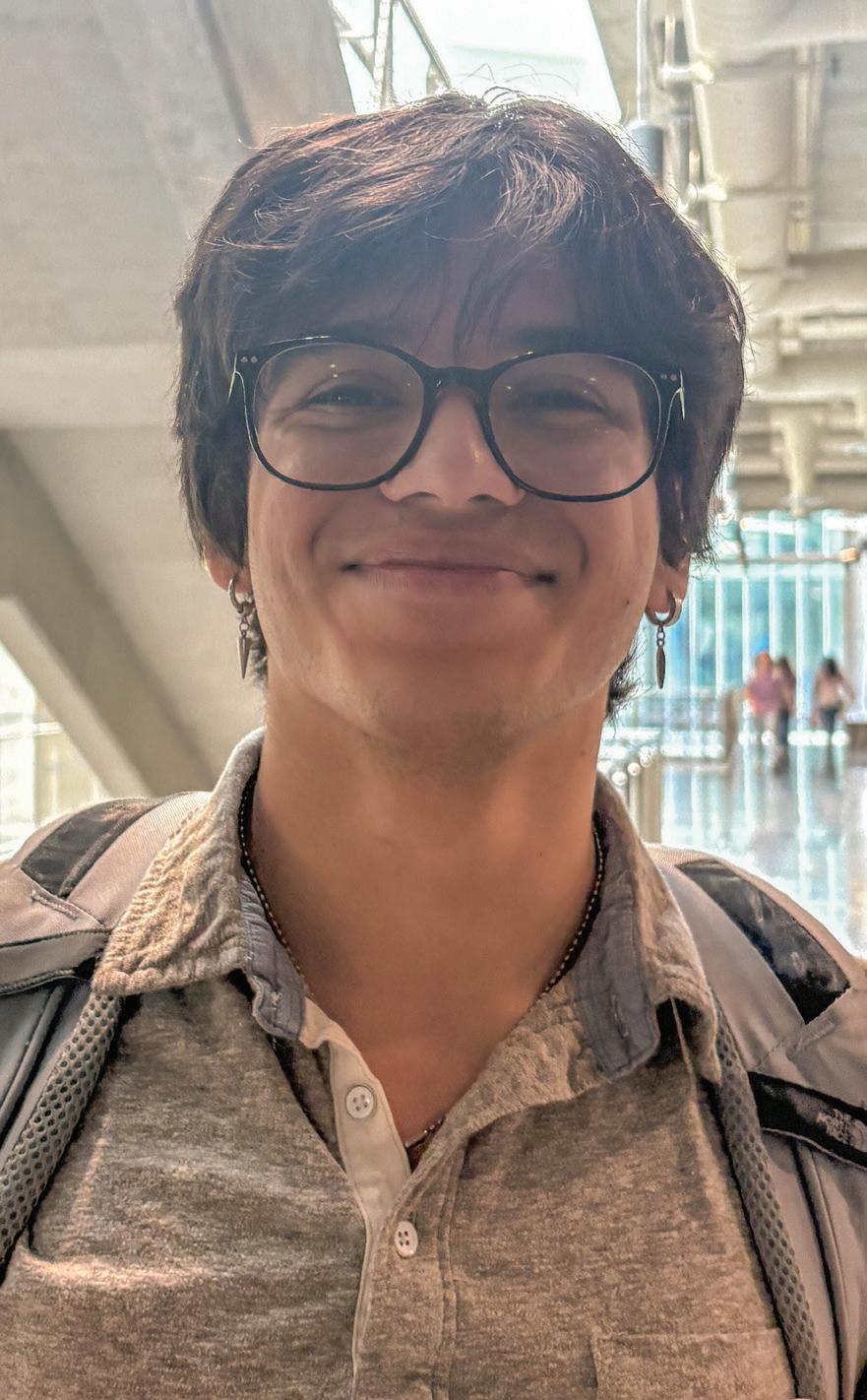

“I was born in Venezuela ... We used to gather every Sunday only to eat, and that was a huge thing, eating traditional food with your family to share moments. I try to find people from my country to share food. I feel like food is a huge thing. It makes you share with others, and that’s what we do ... We like to try to bring our traditions from Venezuela to here. On Christmas with hallacas, it’s really similar to the tamale ... Carnivals, we do parties in the summer, and we dress up in costumes. We throw water balloons at each other. It’s kind of similar to what they do in Brazil with exotic costumes, maybe pretend to be an animal, a bird, something like that. Here, I feel it is way harder for me to celebrate my culture since I’m far from everything. In my country, we walk everywhere, and everyone used to live close.”

“The way I plan on doing it is spending time with my family. Usually we have like a — it’s a carne asada, that’s what we call it. It’s very common in a lot of places. We usually just hang it out with a lot of our families, and we meet up together, and we just all celebrate it. It’s that kind of thing. We do fireworks. Sometimes we have that’s what we call a Rosario. We all pray together, and we all just pray for all our family and everything like that.”
“Personally, for me, this month is important just because it’s a day for us. It’s a day specifically celebrated for us. ... Right now, it’s a difficult time for how all of us are going through things. So I think it’s a beautiful thing to be able to explore and explore into our culture and be able to see how we are as people as well.”
“For me as an example, it would be the food. I think we make some really amazing food. We have some amazing recipes that we have made. I think that’s the biggest thing for me would be food. I love it, especially when I go to Mexico. There’s some amazing food over there that you could just find for very cheap.”
“I will be completely honest, [my culture] is very important to me, but not as it is to other people. I value where I came from, who I am and who I am as a person, and what our background is, but I’m definitely not a big advocate like other people are. There’s definitely people that advocate more of my heritage than I do, but I would definitely say it’s important to me.”
“It’s been a beautiful experience. A lot of people have been very kind to me. A lot of people have shown me different things from different cultures. I’ve learned a lot, and it’s connecting with different types of people.”

“I attend cultural events, not only in Fort Worth, but in Dallas. I even go to Austin ... I attend concerts or parades, or even restaurants ... My family, we [celebrate] it year-round. We have family gatherings, or we organize dinners, or we watch old Mexican movies, even movies in black and white. We don’t say, ‘Oh, we’re going to do this because it’s Hispanic Heritage Month.’ It’s very common for us to do this because it’s part of the culture, even here in the United States. So, we embrace it all year round, even during Thanksgiving. Sometimes, we eat tamales during Thanksgiving.”

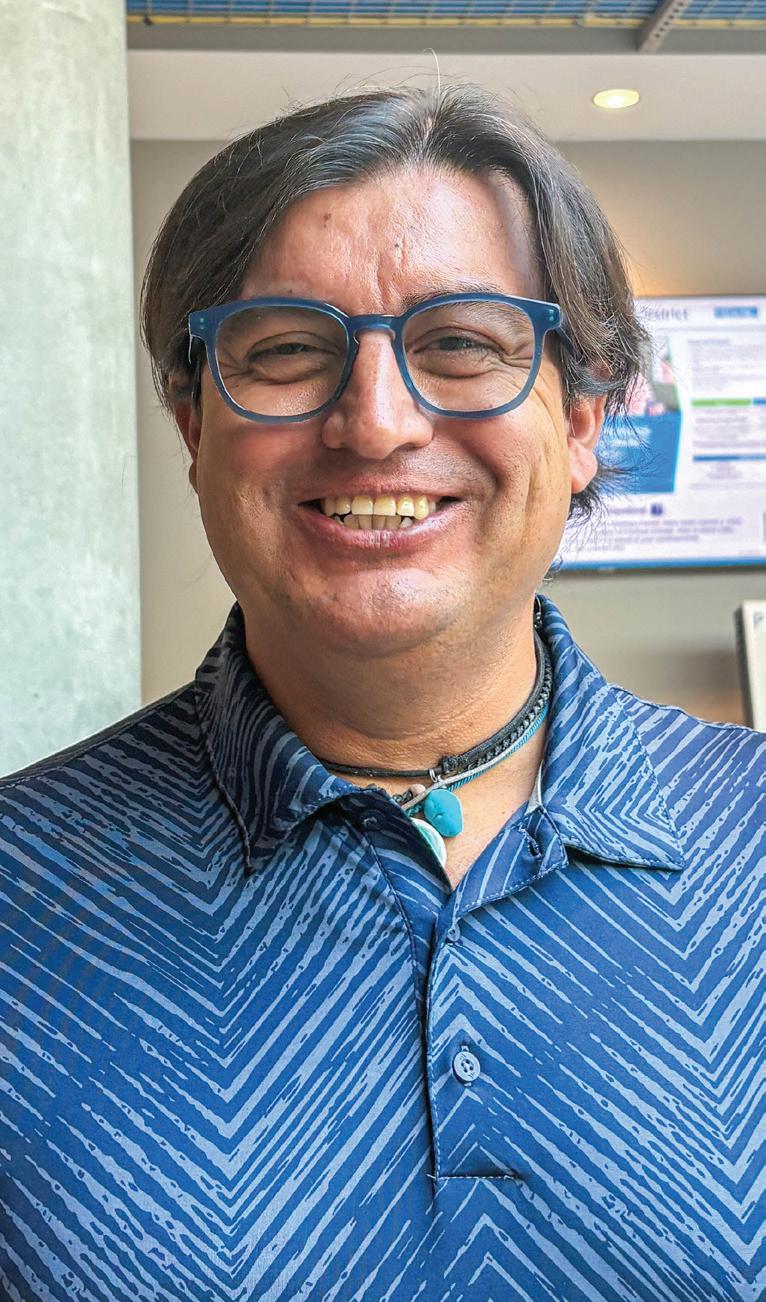

“Growing up in junior high and high school, I was in a predominantly white school ... So, I always felt a little disconnected from my culture ... It’s been recently, really the past year, I would say, that I’ve really begun to embrace the culture and embrace my heritage. I’ve started to listen to a lot of Spanish music. I really like Selena a lot, and it’s more of Tex Mex. Natalia Lafourcade is another artist that I really like. The way that I celebrate my culture now, would be in similar ways that I have in the past, like eating cultural foods, speaking to my family that are in Mexico … I do celebrate the Day of the Dead. My mother was actually born on Day of the Dead. So, it’s sort of like a double party because we get to celebrate her birthday and also the Day of the Dead ... As of recently, I’ve begun to learn how to make enchiladas, and also learn how to make tamales with my grandmother whenever she comes to visit from Mexico and with my mom.”





Owner encourages unity among hot meals, music
Dos Amores, a Mexican restaurant in Hurst, represents the love owner Mauro Cisneros has for his kids, food and culture.
“One of the things that I wanted to do when I first joined this establishment was to bring awareness of Hispanic Heritage,” he said.
Dos Amores has been in the community for 28 years under the name Miguelitos. Cisneros took it over last September, and since then, space has gone from one suite to overcoming the entire shopping strip.
“It expanded and it basically grew with the community,” Cisneros said. “We celebrate our accomplishments as part of the community.”
Their restaurant has joined the Fort Worth Hispanic Chamber of Commerce, a network driving the growth and success of local-Hispanic-owned businesses. Through the network and his restaurant, Cisneros said he wants to help his community.
“What we do is bring awareness of what’s going on with rules and regulations ... That’s how we help each other out,” he said. “This place is more than just a restaurant.”
Dos Amores has a traditional dining area, but to the left sits a lounge, and it’s opened after-hours for dancing.
“We have Tejano bands, rock bands, country bands. So, we’re trying to cater different aspects of different races,” he
said. “Those are tools to bring awareness to different things.”
Cisneros said through food and entertainment, his restaurant provides a way for the community to unite. Dos Amores hosts ladies’ nights where women can salsa, and Latin nights with a DJ mixing Hispanic music.
“In a community, you’re going to have different views, you’re going to have different tastes, you’re going to have different races ... and that’s what we’re trying to target. That diversity of the community,” he said.
General manager Jesus Garcia said he loves working at Dos Amores and sharing his culture with co-workers and customers.
“You come into work, and you have salsa playing or mariachi, and then you see all these customers come in and they love the culture,” Garcia said. “You get to feel the culture, the colors of the restaurant, the food.”
Garcia said they welcome everyone in the community to come and experience their restaurant.
“All the decorations that we have, Mayans, Aztecs, the sombreros, the mariachi, the charros, it’s very colorful,” Garcia said. “We don’t discriminate no one. We love our cultures and we like to make Hispanics feel at home when they come in ... But we also want everyone to experience so they can feel like we’re a family.”
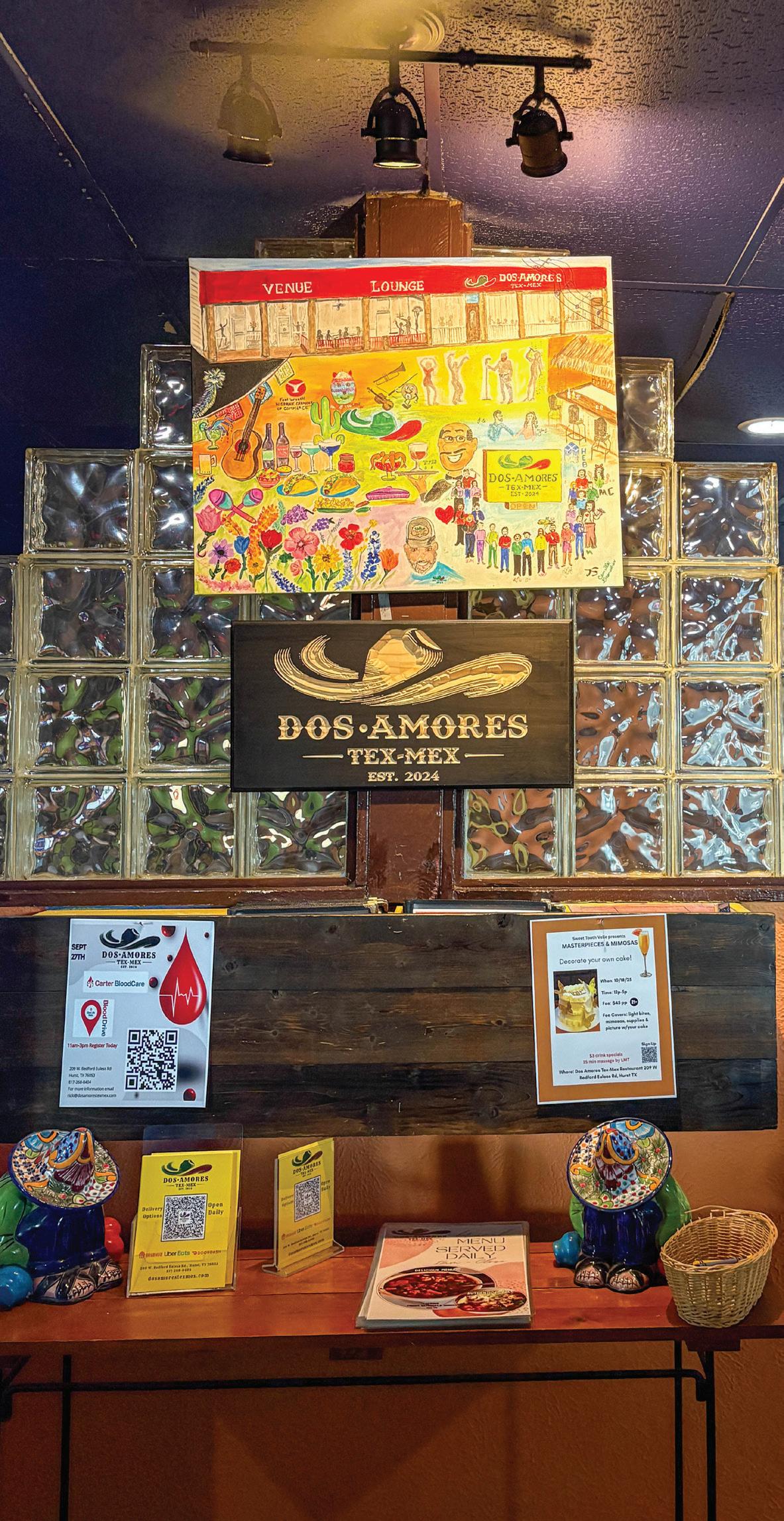
Pride for Puerto Rico shines in newest album
“DeBí TiRAR MáS FOTos,” Bad Bunny’s sixth studio album, is an innovative fusion of past and present which produces an upbeat political statement of a love for his culture.
Bad Bunny, whose name is Benito Antonio Martínez Ocasio, released the album Jan. 5, the beginning of a historical week for Puerto Rico.
On January 6, 1868, Puerto Rican independence leaders founded the Comité Revolucionario de Puerto Rico, or the Revolutionary Committee of Puerto Rico, calling for immediate insurrection against the Spanish colonial system, beginning Grito de Lares (Cry of Lares).
Bad Bunny’s album aims to liberate and critique, as its release followed the Puerto Rican Independence Party’s loss in the 2024 election and Donald Trump’s victory.
His country has strived for independence but remains a U.S. territory.
Puerto Rico is not a state and Congress refuses to grant the country independence, so their citizens are denied voting rights, and cannot vote for their own senators or senators to U.S. Congress.
Puerto Ricans have faced over 150 years of culture erasure and forced assimilation.
Bad Bunny’s lyrics describe the internal struggle of watching Boricua culture be destroyed while he wants to celebrate it.
“DeBí TiRAR MáS FOTos” translates to “I should have taken more photos.”
This title scrapes the surface of describing the pain he feels knowing the colors, dances, clothing and art of his culture is disappearing. He doesn’t want to lose those beautiful images in his mind and created a complex album combining generations of
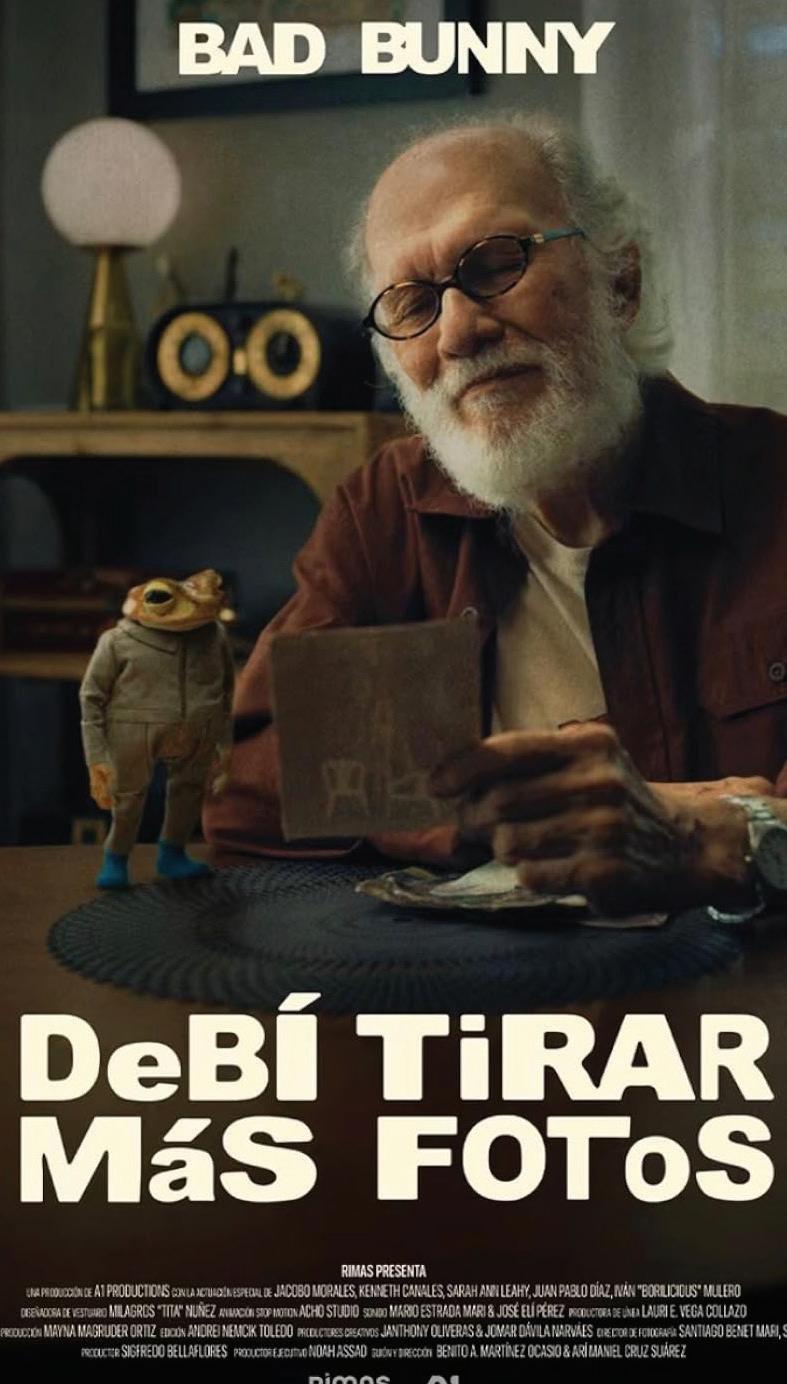







Local restaraunt promotes love of culture
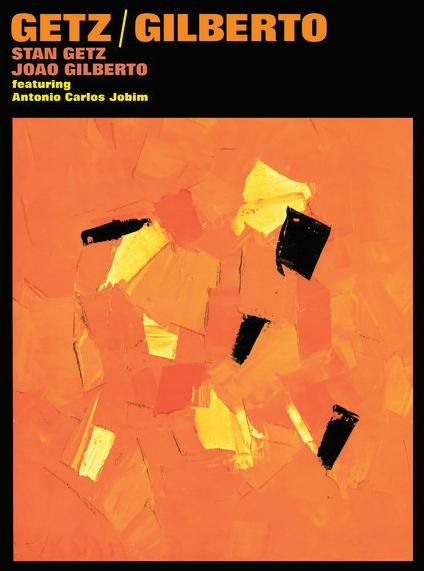
Bossa nova, a genre birthed by samba and jazz together, is one of the many musical genres that familiarized the world to Latin music. It also emphasized the South American culture to foreigners.
João Gilberto is known as the “father of Bossa Nova” for inventing the genre. It took place mostly in Rio de Janeiro, Brazil’s capital, where he would compose and release bossa nova albums.
The bossa nova album “Getz/Gilberto,” created in 1964, was a hit worldwide and shaped the genre’s reputation. The album is a collaboration between Gilberto and Stan Getz, an American saxophonist with a deep love for bossa nova. “The Girl from Ipanema,” the most popular bossa nova song composed by Antônio Carlos Jobim, was made with the help of features by Gilberto’s wife, Astrud. The album created a bridge between American listeners and the Brazilian side of Latin music.
Combination of stunning visuals, family bonds create beautiful story

While Gen Z gets older and we reminisce on our own Pixar landmark movies, “Coco” marked the start of the new generation’s nostalgia.
To date, the movie has amassed 814 million dollars worldwide. It’s a no-brainer as to why, because in all the movie has an amazing storyline that illustrates the strength of family bonds and how culture keeps them alive.
It’s a tribute to traditional Mexican culture, and the strong themes of how power is found in the connection of family keeps you drawn into the storyline, if the music wasn’t already enough.
The themes of remembrance are potent, as well. The idea that the dead become forgotten and lost without an ofrenda symbolizes the importance of remembering your loved ones and the memory you have of them.
It’s as they say, you die twice – the first when you are buried and the last time some-
one says your name. Visually, the movie is stunning. The colors are vibrant and welcoming, and it’s so full of textures as if you can feel the flower petals that pad the path from the living world to the dead.
The lighting is warm, inviting and accentuates the world around Miguel to illustrate the mood of the scenes.
The music was and will always be iconic to the movie. “Remember Me” will likely last generations, and when those children who watched “Coco” grow up more I believe it will be on the roster of throwbacks for them to look back on.
It is as a children’s movie should be. It walks you through the cultural story of a boy, highlights the conflict and resolution that expresses the idea that not everyone is as they seem, and encourages you to realize who you will always have by your side.
Even if it’s an ancient Aztec Xoloitzcuintli, Dante, who is Miguel’s spirit guide.
New legislation targets vulnerable transgender Texans
The recently signed bathroom bill targets transgender people in Texas by making the bathroom an unsafe place for them.
Senate Bill 8 was recently signed into law by Gov. Greg Abbott and takes effect Dec. 4. It says that users of bathrooms in all public buildings can only use the one that matches their assigned sex at birth, and it penalizes not just the person who breaks this law but also the institution.
This law is a flagrant violation of the 14th Amendment. One of its clauses says no state shall “deny to any person within its jurisdiction the equal protection of the laws.”
Policing the bathroom to make sure transgender people don’t use the one they feel most comfortable using is not granting them equal protection. It only puts a target on the backs of the already vulnerable group.
And it does so under the guise of protecting women.
Abbott said in a video posted on X that the bill would “keep men out of women’s restrooms.” In fact, the bill is called the Texas Women’s Privacy Act.
The thing that lawmakers who supported this bill don’t seem to get is that this law doesn’t protect anybody. It actually makes things more dangerous. It reinforces the stereotype of the predatory transgender person in the women’s bathroom and gives that unfounded fear legal backing.
It’s not a shocking turn of events
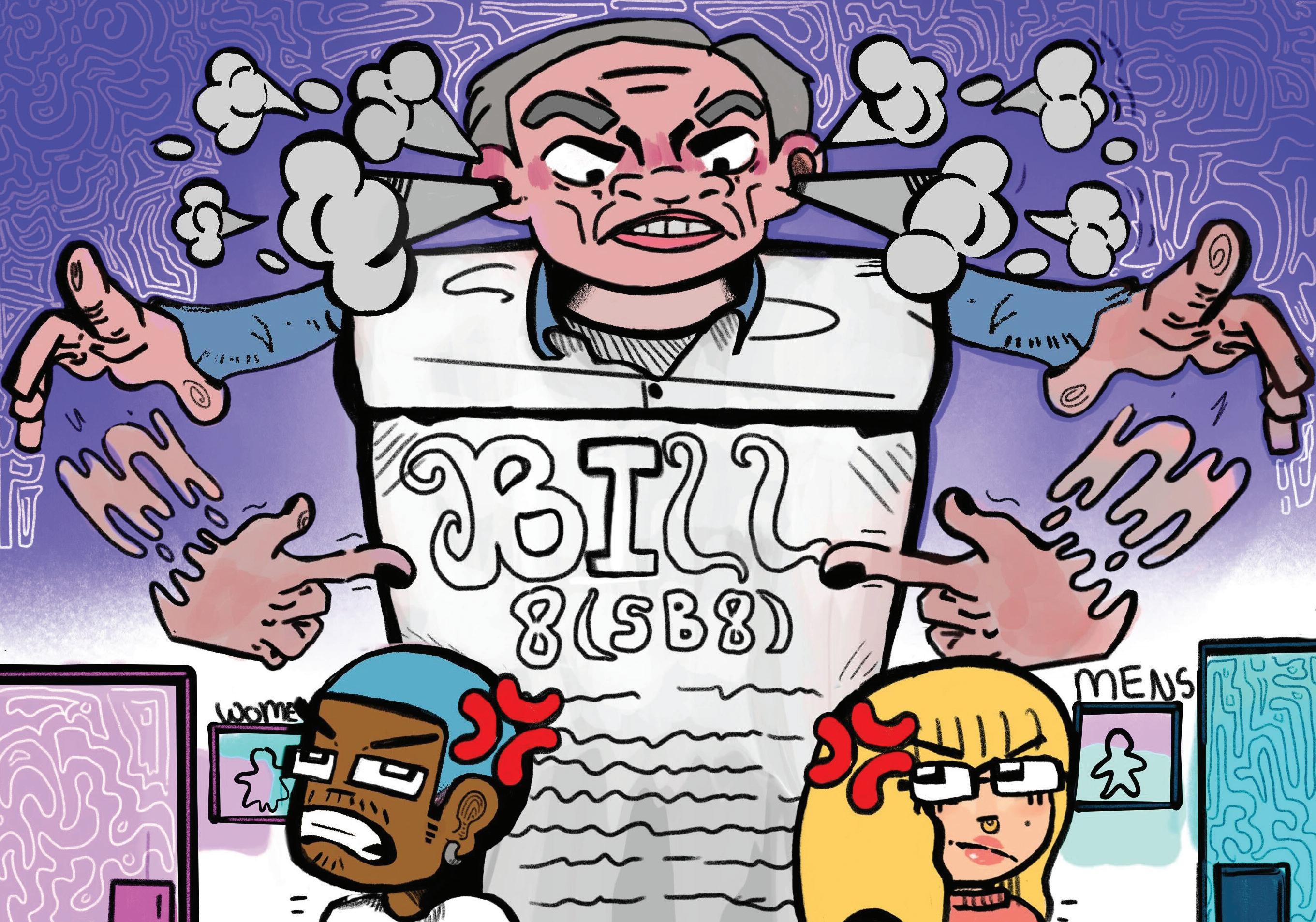
to see Texas lawmakers turn their backs on their transgender citizens, but it certainly is upsetting. The law is a sign that the hate and fear against the transgender community from some conservatives in Texas has reached its next step.
Even with transgender people making up less than 1% of the population in Texas, they are still consistently singled-out by legislation and politics. They are easy targets. No
party is willing to stand behind them because of the divisive nature of their mere existence.
It is just not possible to win a nationwide election if you support transgender people. According to a Gallup poll from last year, only 44% of U.S. adults think that changing one’s gender is morally acceptable.
Some people even think being transgender is a sign of a disturbed person, and that it
should be eliminated. Conservative political commentator Michael Knowles said in a speech at the 2023 Conservative Political Action Conference that “for the good of society, and especially for the good of the poor people who have fallen prey to this confusion, transgenderism must be eradicated from public life entirely.” He received applause for that statement.
It’s a scary world for transgen-
der people. They grapple with gender dysphoria, growing social and political isolation, medical stressors and an America that seems to hate them.
These are only some reasons why transgender people have significantly higher suicide rates than the general population, according to the Center for Suicide Prevention.
Transgender people also must deal with the fear of being the victim of violence just for being who they are.
In a 2024 report by the Human Rights Campaign, 372 transgender individuals have been victims of fatal violence in the U.S. since 2013, with transgender women making up over 80% of victims. We are not far from those backward days of murdering people for the crime of wanting to be recognized and respected. Yet lawmakers focus on demonizing transgender people, especially transgender women, and using fearmongering tactics to scare Americans into hating their fellow citizens. This law, and those like it, will not stand in the future.
Maybe it won’t be struck down in a year, two years or even until the next presidency if the state of the conservative Supreme Court is to be judged.
But one day, Americans will look back on these laws for the malicious and disgraceful actions they are, just as we look back at other shameful chapters of our history.
The recent state law forcing public K-12 schools to display the Ten Commandments in classrooms is a blatant violation of the freedom of religion.
This law being passed and signed is a worrying sign that the line that separates church and state is becoming more blurred as Republican lawmakers take advantage of a politically chaotic America to turn this nation backward.
Attorney General Ken Paxton instructed Texas schools in an Aug. 25 press release to display the Ten Commandments, saying the text is “irrevocably intertwined” with American heritage.
“The woke radicals seeking to erase our nation’s history will be defeated,” Paxton said. “I will not back down from defending the virtues and values that built this country.”
The phrasing of Paxton’s statement also shows how modern conservative politics revolves around going “back to the old days” and
It is impossible to be a tween. From going through puberty to selfdiscovery, kids aged 10 to 15 have it the hardest, and the entertainment industry hasn’t made it any easier.
Whether it’s movies, shows, books or now even Halloween costumes, the line between adult and adolescent media has become dangerously thin.
“Terrifier 3” is a horror film that came out in 2024 and was extremely popular because of the gruesome gore the film presented. People online talked about how they had to walk out mid-movie because of how realistic and violent the gore scenes were. Some even threw up in the theater.
The “Terrifier Trilogy” follows a killer clown named Art and his journey of killing people in a small town in New York. Like most horror films, the clown goes on a murder rampage, gets defeated and then somehow magically appears again in the sequel.
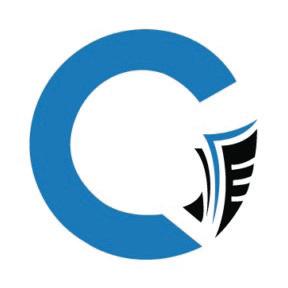

emphasizes traditional American values.
These laws aren’t meant to bring American forward. It shows that lawmakers are willing to turn the course of American history backward to avoid the changes the world is collectively heading toward.
More pressingly, this law is aimed directly at the future generation of Americans who will take over the reins once their time comes.
But these Americans are not
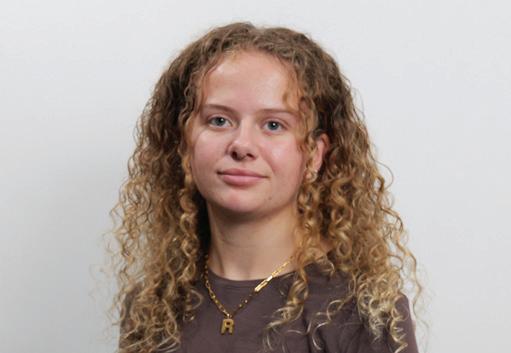
Obviously, it’s not a movie for children. So, when I was walking through Spirit Halloween over the weekend, I was shocked to see what sat between the “Gabby Dollhouse” and “Ms. Rachel” costumes. It was a kid’s Art the Clown costume with his signature flower sunglasses and a bloody knife. Hopefully, kids have no idea whom the outfit is referring to, but kids are inquisitive. All it takes is for one curious
just Christian.
According to Pew Research Center, 62% of U.S. adults identified as Christian, 7% identified with other religions and 29% were unaffiliated with religion.
That is a significant portion of Americans who would not agree with first of the Ten Commandments: “I am the Lord thy God. Thou shalt have no other gods before me.”
The classroom is a space of learning and freedom of thought. Children go there to learn about the world, history and culture. To have these students, many of whom are not Christian, see the Ten Commandments during every class will only say one thing: America backs Christians and no one else.
Some have been fighting against this law.
Several school districts were sued after the bill was signed into law by Gov. Greg Abbott on June 20, and the law was temporarily blocked by a federal judge, so some
10-year-old to use their iPad and search up Art the Clown on YouTube and immediately become traumatized, all without the parent knowing.
According to the American Academy of Pediatrics, the average American will see at least 40,000 simulated murders and 200,000 violent acts on TV alone during their childhood.
I’ve seen firsthand how this can impact children’s behavior.
After I graduated from high school, I took a gap year and worked as an educational assistant in a special education classroom with 4-year-olds.
There were already kids showing violent behaviors as a result of watching certain media.
The kids who were constantly biting, hitting and screaming were often the ones who would make references to violent online content such as the rated R “Deadpool” films.
school districts are exempt from the law for now.
Another suit was also recently filed against other school districts, including some in the Dallas-Fort Worth area like Fort Worth, Azle, Arlington, Mansfield and Northwest.
Teachers across Texas are fighting back by decorating around the Ten Commandments with other religious texts, creating buttons with the First Amendment written on it to promote discussions about religious freedom and some are even risking their jobs by choosing not to display it.
It’s clear that many Texas teachers do not agree with this law and believe it will negatively affect their students. According to an NBC News article, some teachers are worried that the display of the Ten Commandments would give the message that the law favors one religion over others and spark conversations that they don’t want to have while in a
Violence isn’t the only issue.
The hit show “The Summer I Turned Pretty” is based off a threebook series that is generally recommended for readers in middle school. The plot follows a young girl and her journey of growing up, grief and a love triangle between two brothers that she has known her whole life.
Earlier this summer, the third season premiered, and I was stunned to see how many sex scenes were presented in the series.
For a show based off a book targeted for kids 12 and up, it is alarming to see any display of affection past a hug or a light make-out session.
Today’s entertainment industry has failed to create age-appropriate media for preteens, leaving them to watch adult content that their brains aren’t ready to receive.
Watching this type of media at such a young age can lead to depression, behavioral issues, low



school setting.
Some teachers also say that some of what appears in the Ten Commandments would not make sense to younger children, with one example being how one commandment says, “ You shall not commit adultery.”
The Founding Fathers laid the foundation of what the United States would become hundreds of years ago.
In a letter to the Danbury Baptists, Thomas Jefferson emphasized his belief that religion was a matter between man and God, while emphasizing the importance of “building a wall of separation between Church & State.”
The Bill of Rights’ first clause directly addresses this matter, saying definitively “Congress shall make no law respecting an establishment of religion, or prohibiting the free exercise thereof.”
Yet, Texas lawmakers have failed their citizens by violating this principle.
self-esteem and substance addiction and many other issues.
When I was a tween, I was an avid Disney Channel watcher. I would build my schedule around the latest “Descendants” movie that would come out.
But today, streaming services make it impossible for tweens to find media to fit their age. Platforms like Netflix that have designated accounts for kids only promote shows for babies, making older kids branch out to adult content.
Without specific channels for age-appropriate media, kids just search for what’s popular on social media and watch it, regardless of what type of content it presents. We are so protective of children in the first years of their lives. As they enter the awkward preteen stages, we must also seek ways to care for their mental well-being, starting with the entertainment they consume.
PTK adviser encourages students to join
NE history instructor Samantha Elkins is an adviser for the NE chapter of the honor society Phi Theta Kappa. She shared her experience of working with students at PTK and why she believes students should be more involved on campus in an interview with The Collegian.
What exactly do you do at PTK?
I’m currently the PTK lead adviser. We have a lot of advisers for PTK, and that’s really good, because a lot of what we do is we are helping the students maintain our five-star chapter status. A lot of stuff for me is we tend to put at least one adviser email on all of our flyers. People reach out, ask questions. There’s a lot of weird paperwork stuff that has to be done for PTK. ... A lot of it’s that kind of stuff, but then a lot of its institutional knowledge that can help out our officers. We do not do it for them. They are the ones that come up with the ideas, do the research, implement the ideas, and that one’s more community oriented.
Do you enjoy working with PTK?
I love working with PTK. It honestly is one of the most fun things I get to do. It can be stressful, mostly because you worry about the students, but you get to know the students so well. ... In many ways, what they’re doing at PTK almost feels beyond TCC anyway because they’re already looking at their community impact. They’re already looking at bettering the college, not just as a student even. And each year you basically get a new officer team and the students they’re all different every year. So you never know what kind of personalities or what kind of things are going to come up or what problems, but also you get different problem solving techniques I get to learn from them, ideas that I’ve never done before and it’s really so fun to see what things they bring to the table and you get to know them really personally. You get to see that personal growth. It’s like my favorite thing.
What kind of skills do students develop at PTK?
The four pillars of PTK that they build off of is leadership, service, scholarship and fellowship. Those are one of the biggest skills,
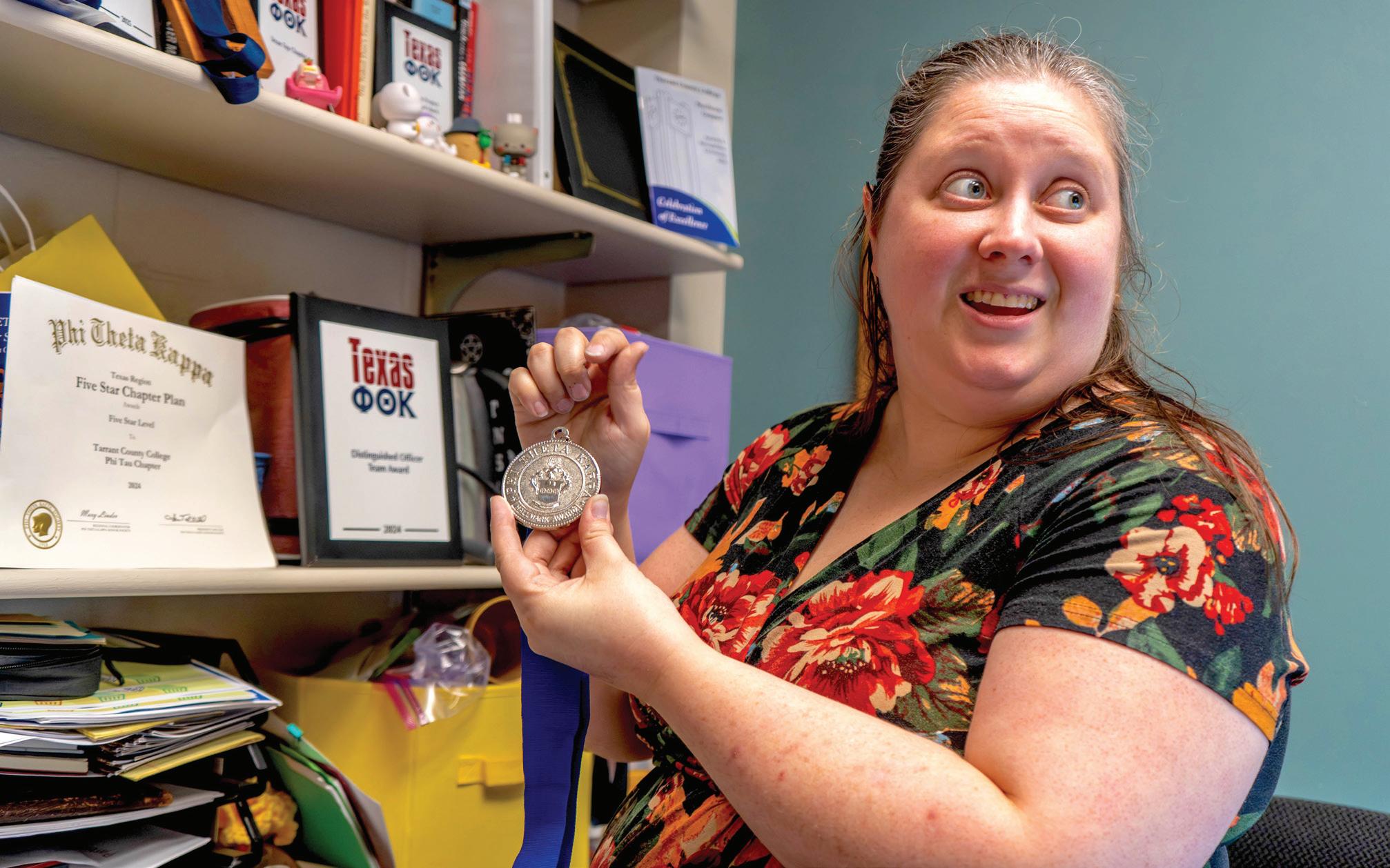
Burt
an
like leadership skills. I definitely see my officer team really develop those. But there’s so many other skills that get the opportunity to develop as well, coming to meetings, developing friendships. So, you can have that fellowship that really develops. You get to see them develop just confidence, stronger friendships, which then leads to more confidence. You get this kind of community, which is really nice to have. Quite frankly, it’s wonderful.
How has PTK influenced the TCC community?
We’re involved. That’s one of the biggest things. We are 100% involved. This officer team, when they’re originally going for elections, they have to interview with an adviser, and a big bulk of the officers. This last year, every one that I interviewed was like, “I want a community here at TCC, I want more community for students even if they’re not PTK members.” ... This is meant for everyone. This is meant to help everyone, and we want to build that, and so a lot of our college projects focus on that.
What kind of advice would you give for students interested in PTK?
First one is join Pre-PTK, mostly because then you’re already getting involved. Come to PTK meetings. You don’t have to be a member to come to our meetings. The other thing is just take advantage of all the different resources our campus has. Get help if you’re struggling in classes and you’re wanting to join.
Do you encourage students to run PTK? We try to make the students do as much of it as possible. We don’t write for them. The big stuff that is all put into the PTK system, we don’t do that. When we do a certain kind of paperwork going through Student Activities, we’ll sit down and do it with somebody so they can see how to do it and what kinds of things to do in the future, and then it’s their responsibility to do that from now on. We want to show them the ropes but at the end of the day, it’s kind of up to them. ... At the end of the day, it is student-led. They’re the ones deciding ... what is important.


